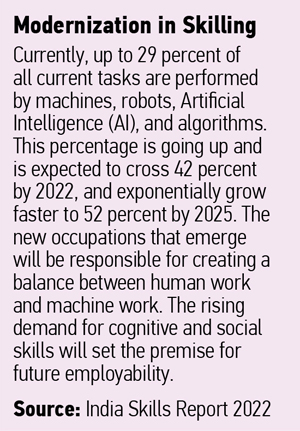Future-proofing the Workforce

Digital technologies are disrupting India’s manufacturing industry, which has huge job potential. Industry experts discuss the importance of enhancing employees’ soft skills through digital tools to shape the industry’s future, and the key skill sets hiring managers look for in potential employees.
Manufacturing is all about teamwork; when everyone performs their role and integrates with the team, the operation runs smoothly and efficiently. The work in manufacturing can be demanding, repetitive, and time-sensitive, and you may have to work long and unsociable hours. Therefore, to thrive in the Manufacturing industry, you need to develop a strong work ethic and always be able to put in 100 percent at work.
Managing time and workload
Most roles involve a lot of different tasks. Hence, managing your time well and putting things in the right order is essential. The work can be fast-paced and precise, so attention to detail is vital for performing tasks and working safely in a potentially dangerous environment.
Problems can constantly arise; being able to think critically and quickly is a skill that will help you get ahead. When you work in manufacturing, you are a small yet integral part of the daily operation. Therefore, dependability is a vital quality looked for in employees in the Manufacturing industry.
Ours is an industry that relies heavily on technology and equipment, so it is critical that those who are seeking to get into it have a natural aptitude for them so that they can be trained quickly and become comfortable with the relevant technology and equipment.
Skilling and reskilling
Today, every company is a potential digital enterprise. This is a critical phase in the industrial evolution marked by computers, mobile devices, internet connectivity, data, robotics, 3D technologies, augmented reality, cloud computing, and a host of other developments that are shaping the new age of workplace skills in the Manufacturing sector.
However, advanced technologies do not mean human replacement—instead, new human skills are required. To navigate these new waters, reskilling and upskilling existing workers will be crucial and, if done right, will save companies time and money while continuing to meet the evolving demands of consumers. Skilling must be intentional, demonstrable, and active. Sessions should be interactive and include periodic assessments to test how employees grasp new skills.
Focusing on sub-skills
Digital technologies can enhance training on multiple fronts. Skills like using a tablet, mobile phone, or computer to take simulated recruitment tests for various sub-skills should be taught. These include the fundamentals of human-computer interaction, the use of touch screen interfaces, overcoming digital anxiety and phobia, playing digital games, performing simulated tasks, and so on.
Second, digital training tools improve training speed and retention. They can be designed to target the most difficult parts of tasks and are optimized for learners who need visual and experiential support. At the end of this transformation process, successful industrial companies will become true digital enterprises, with physical products at their core, augmented by digital interfaces and data-based, innovative services. These enterprises will work together with customers and suppliers in industrial digital ecosystems.
 ICAD started off as a Technology Integrator, however with the acquisition of AMG Systems in the UK, we have joined as the largest and only ICT manufacturer in the UK. We are also starting the manufacture of decorative lights in Cyprus under the auspices of ICAD Europe. Similarly, we are looking to acquire seaplane manufacturers in the US.
ICAD started off as a Technology Integrator, however with the acquisition of AMG Systems in the UK, we have joined as the largest and only ICT manufacturer in the UK. We are also starting the manufacture of decorative lights in Cyprus under the auspices of ICAD Europe. Similarly, we are looking to acquire seaplane manufacturers in the US.
For prospective employees, we would look for people with a passion to excel, intuitive design capabilities, knowledge of global market trends, a grip on the local and international market requirements/demands, capability to think out of the box, and excellence in modern design tools and software.
Staying updated with the latest technologies
It is extremely important for all employees, irrespective of sector, to keep abreast with the technologies of their field, global trends, and market requirements. Upskilling and re-skilling is not a choice, but a necessity for any sector or vertical. Given how the Manufacturing industry is expected to be valued at US$125 trillion by 2025, it is essential for the workers to receive training in handling crises efficiently. As technology is developing at a rapid pace, learning more than one technical skill and being adept in artificial intelligence is pertinent for workers to strike the apt balance between human touch and machine learning.
Reskilling from the grassroots level could be a challenge. But this will help us keep up with the industry’s skyrocketing competition and automation. It’s no surprise that the mechanical age is here to stay. However, the need for cognitive and social skills will always be essential for workers to thrive and shape the nation into a technological superpower.
Digital tools bolster soft skills
Modern companies treat their workers as their greatest resource. Only those companies that value their human assets and constantly work towards the upgradation of their soft skills can survive in the market today. By utilizing technologies that are applicable to their scope of work, they can maximize available potential without increasing the cost. This makes the ventures profitable while retaining the best minds/talents in their workforce.
Improving one's ability to communicate effectively and one's capacity for analytical thought may, in the long run, be of use in promoting both personal and professional development. Employees can only feel confident about their decision-making abilities and digital know-how if they have been encouraged to be innovative from the very beginning of their training years. If we make an early investment in their development, we can have peace of mind knowing that India's future will be led by dynamic leaders who are still in the process of maturing.
 The Manufacturing sector in India is undergoing rapid change, with emerging technologies taking the center stage in developing a new generation of products. It has thus become necessary for employees to match up to the new skill requirements of organizations. While learning and skilling have always been important, constant skill upgradation has acquired new importance in the ongoing global scenario, especially with the advent of Industry 4.0, which seeks to redefine the sector through the use of Artificial Intelligence (AI), Machine Learning (ML), Virtual Reality (VR), and Augmented Reality (AR). India, with its large base of skilled manpower and favorable demography, is best positioned to take advantage of Industry 4.0 and become an industrial and technological superpower.
The Manufacturing sector in India is undergoing rapid change, with emerging technologies taking the center stage in developing a new generation of products. It has thus become necessary for employees to match up to the new skill requirements of organizations. While learning and skilling have always been important, constant skill upgradation has acquired new importance in the ongoing global scenario, especially with the advent of Industry 4.0, which seeks to redefine the sector through the use of Artificial Intelligence (AI), Machine Learning (ML), Virtual Reality (VR), and Augmented Reality (AR). India, with its large base of skilled manpower and favorable demography, is best positioned to take advantage of Industry 4.0 and become an industrial and technological superpower.
At the cusp of innovation
The new automation revolution will have a major effect on employment. Nearly every job will change, and that will require employees to develop new skills. There is an increase in demand for social, behavioral, and cognitive skills. Soft skills tend to be more personality-focused and include people skills, social skills, interpersonal skills, and transferable skills. The most in-demand soft skills include leadership skills, communication, collaboration, and time management.
Individuals who exhibit both technical know-how and new-age soft skills will benefit the most from the current trend, as organizations are looking for employees with holistic skills. Indian industry experts realize that we are at the juncture of endowing the world with innovation not only in technology but with skilled manpower that is willing to learn, unlearn, and relearn. Today’s workforce has become more tech-savvy, and concepts like digitalization as well as Industry 4.0 certainly complement each other.
 In recent years, the shift from assembly-line manufacturing to technology-driven manufacturing has changed the way companies hire prospective employees. As manufacturing facilities and workspaces are constantly changing due to technological advancements, employers are more likely to hire individuals who are skilled in digital technologies.
In recent years, the shift from assembly-line manufacturing to technology-driven manufacturing has changed the way companies hire prospective employees. As manufacturing facilities and workspaces are constantly changing due to technological advancements, employers are more likely to hire individuals who are skilled in digital technologies.
For instance, the Manufacturing industry in India is relatively new to digitalization. But we all know how important it is to the future of work. To implement and make efficient use of new digital marketing systems or sales platforms, you need talent that can work with data and analytics, which for many manufacturers is foreign territory. In these scenarios, talent brings with it new and emerging skill sets. At the same time, training, reskilling, and enablement of existing employees is also imperative.
Manufacturers today need to embrace the future by being innovative, adaptable, and change-management-focused. In many cases, attracting the right talent isn’t only a case of upgrading systems, technologies, and processes; it’s about creating appropriate roles that enable those upgrades.
Filling the skills gap
Re-skilling the workforce is one of the most significant challenges and opportunities we face at this moment. There was a growing digital skills gap before the pandemic. However, with the importance of digitalization in rebuilding the economy and society, that gap has gotten even greater. As per insight from the Digital Skills Index, India leads in digital skills readiness with 72 percent of respondents in India actively learning new digital skills now.
An entirely new set of skills such as 3D printing, Internet of Things (IoT), and robotics are causing massive changes in the Manufacturing sector, which means that manufacturing system employees must deal with manufacturing in a fundamentally different way. To address the growing skills gap, companies must invest in enabling their workforce to learn the skills they require for their jobs now and in the future. We support the skilling imperative via an extensive list of important platforms, projects, initiatives, and investments that offer something for everyone. For example, Trailhead, Salesforce’s free online learning platform, democratizes digital learning by helping participants with low technical knowledge obtain a Salesforce role in as little as six months.
Individuals who possess both technical knowledge and new-age soft skills stand to benefit the most from the current trend, with companies eager to hire professionals with a comprehensive skill set. Organizations that build work environments where everyone can thrive are equally likely to be the most resilient in the future as they begin new ways of working.
Deepening relationships for growth
Forward-thinking manufacturers are defining, developing, and rapidly accelerating digitization to compete on the most important market differentiator: their ability to understand, engage, and earn the trust of their ecosystem. These companies put their employees first.While not all manufacturing jobs will necessarily require extensive training in software development or IT, they will require knowledge of digital technologies and systems. Manufacturers are commencing their journeys toward digital transformation. It has become critical to provide a differentiated customer experience while remaining profitable. According to our latest State of Sales research, 74 percent of sales leaders in manufacturing say that digital transformation is accelerating for them. They are investing in technology to do something very human—deepen relationships—and as a result, they’re growing.
Manufacturing, despite its mechanical complexity, remains a human industry in many ways. Humans are present in every aspect of manufacturing, creation, marketing, selling, coordinating, and everything in between. As a result, one can agree that soft skills such as critical thinking, interpersonal relationship building, ability to manage others, persuasion, and empathy will become increasingly important in the coming years. Many believe that manufacturers who learn to use digital tools to enhance workers’ soft skills will make the most progress.
 For centuries, the Manufacturing industry has been heavily dependent on manual labor. Basic skill requirements include conducting physical tasks like weight lifting and carrying items from one place to another. However, as automation penetrates many aspects of the Manufacturing industry, there will be significant shifts in the skill profiles of manufacturing jobs. The manual and dangerous tasks that were once completed by human labor are now conducted by collaborative robots, or cobots. Cobots relieve human workers from heavy weightlifting and rigorous repetitive tasks, so they can focus on higher-value tasks.
For centuries, the Manufacturing industry has been heavily dependent on manual labor. Basic skill requirements include conducting physical tasks like weight lifting and carrying items from one place to another. However, as automation penetrates many aspects of the Manufacturing industry, there will be significant shifts in the skill profiles of manufacturing jobs. The manual and dangerous tasks that were once completed by human labor are now conducted by collaborative robots, or cobots. Cobots relieve human workers from heavy weightlifting and rigorous repetitive tasks, so they can focus on higher-value tasks.
With cobots working on manual tasks, manufacturing hiring managers are now looking for soft skills in employees such as creativity, cognitive skills, and social skills. Nonetheless, this does not imply that companies replace their existing employees with machines. Unlike traditional industrial robots that require professional engineers to operate, cobots are easily programmable. Even employees with no robotic background are capable of handling a cobot.
Skilling for efficiency and productivity
With emerging technologies, more and more machines (such as cobots) are being deployed in the Manufacturing industry, which requires skilled workers for their operation. The focus has shifted from basic survival skills to skills like resilience, critical thinking, and quick decision-making in the workforce. These skills can be given to employees through training and re-training, as well as skilling and reskilling. Training and skilling of employees are among the most pressing priorities to generate higher efficiency and productivity.
As robotics education becomes more prevalent, there is a greater need for human-machine collaboration. Universal Robots introduces the UR Academy, where learners, employees, manufacturers, and career seekers can learn basic robotic skills through free online training modules, webinars, and video tutorials. Moreover, technical skills need to be introduced by the manufacturers to keep pace with the changing times. Soft skills for a competitive edge
Soft skills for a competitive edge
The exponential growth in technology has changed the face of the world. Cobots are relieving human workers from dull, dirty, and dangerous tasks. Cobots have taken the stage and are transforming operations worldwide. This drives the importance of having a skilled workforce with the right technical training. Reskilling and training play a very pivotal role not only in the growth of employees, but also in increasing an organization’s efficiency and productivity.
Skill up-gradation is important in the current global scenario, especially since the advent of Industry 4.0 with automation, machine learning, and different digital processes of manufacturing.
Amplifying workers’ soft skills gives companies a competitive edge in the market. Moreover, to ensure all employees are keeping pace with the advances, industry leaders need to quickly embark on retraining and reskilling initiatives. For instance, Hyundae Induction Hardening Heat Treatment (HIHHT) installed two UR10 cobots in its production line. This resulted in a decrease in the failure rate from 0.03 percent to 0.01 percent and an increase in production efficiency by 31 percent. Additionally, automating the production processes allows HIHHT to hire two more employees.

Sovan Tudu
Sub-Editor
Magic Wand Media Inc
Sovan.tudu@magicwandmedia.in
Source: India Skills Report 2022



 Facebook
Facebook.png) Twitter
Twitter Linkedin
Linkedin Subscribe
Subscribe